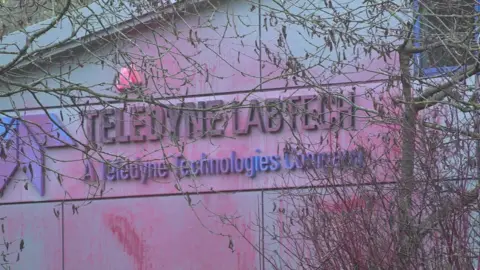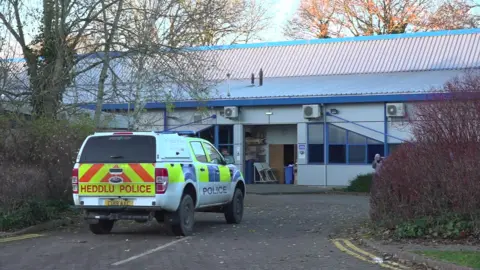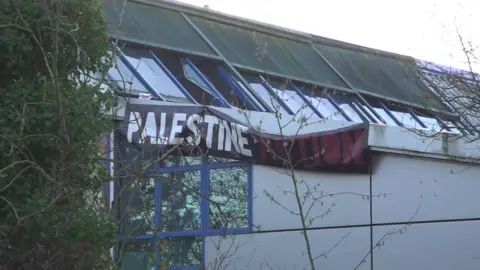Protester drilled holes through factory roof
 BBC
BBC- Ruth Hogg, 40, from Aberystwyth, has been found guilty of conspiracy to commit criminal damage at the Teledyne Labtech factory in Presteigne, Powys
- As part of a political protest, Hogg and several others drilled holes in the roof of the factory which makes printed circuit boards
- Three others have already pleaded guilty to the same charge
- The protest was likened to a "terrorist attack" on "people who didn’t deserve it” by the prosecutor
An artist has been convicted for her role in a protest that caused £1.2m in damage to a factory.
Ruth Hogg, 40, was part of a group that believed the Teledyne Labtech at Presteigne, Powys, made circuit boards for Israeli drones.
Hogg, a Palestine activist from Aberystwyth, Ceredigion, was found guilty of conspiracy to commit criminal damage following the incident on 9 December last year.
Two other women and a man had already pleaded guilty to the same charge at Caernarfon Crown Court.

The trial heard how workers were sat drinking coffee in the site canteen when they heard the sound of breaking glass.
Hogg was one of two protesters who had climbed onto the factory roof, where she admitted smashing panes of glass and was filmed drilling holes.
She also admitted spraying red paint into the plant.
Two other protesters had entered the factory floor and smashed computer screens, sprayed paint, and set off smoke grenades.
A banner in support of Palestine was also unfurled across the side of the factory.
'Soft target'
Prosecutor Elen Owen said the attack was "professionally planned" and likened it to a "terrorist attack".
“They targeted a small factory in rural Wales with, at best, tenuous links to the arms companies because it would give them maximum publicity for minimum effort,” said Ms Owen.
The prosecution said the site was not a military facility, but a factory which made circuit boards for MRI scanners and radar equipment.
One witness for Teledyne told the jury that while some of its products made at the site could have had military use, it was only about 2% of what they did.
The jury was told that the factory last made circuit boards for Israel in 2009, which were used for mobile phone towers.
The trial heard the factory was out of action for about three weeks to repair damage and clean the site.

Defending Hogg, James Manning told the jury that Hogg was “a person of good heart” who believed she was acting to help those in Palestine.
He said the Phd postgraduate researcher, who worked at an arts centre in Aberyswtyh, was "clearly a person who has very pronounced views”.
“People take action and it causes change, and you have to look at this case through that prism," added Mr Manning.
“She is a person of integrity.”
Susan Bagshaw, 65, of Clawdd Helyg, Commins Coch, Morwenna Grey, 41, of Penrallt Street, Machynlleth, and Tristan Dixon, 34, of Huddersfield, all pleaded guilty to conspiracy to commit criminal damage at the start of the trial.
All four defendants have been remanded in custody for sentencing at Mold Crown Court in June.
Addressing Hogg, Judge Rhys Rowlands said he did not doubt the sincerity of her beliefs.
“Good people on occasion do bad things - and this was a very bad thing,” he said.
